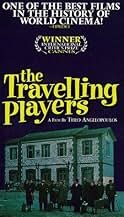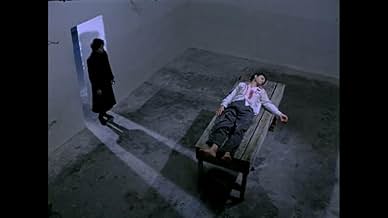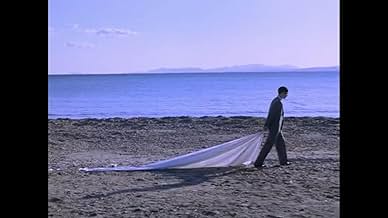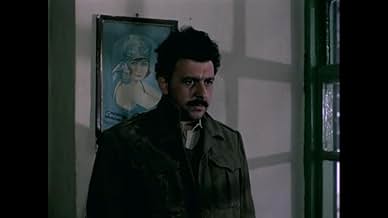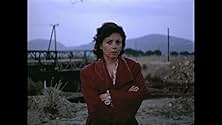O thiasos
- 1975
- 3 घं 50 मि
IMDb रेटिंग
7.8/10
4.6 हज़ार
आपकी रेटिंग
अपनी भाषा में प्लॉट जोड़ेंGreece, 1939-1952: Fascist, Nazi, and Communist conflict, as seen through the eyes of a family of travelling provincial players.Greece, 1939-1952: Fascist, Nazi, and Communist conflict, as seen through the eyes of a family of travelling provincial players.Greece, 1939-1952: Fascist, Nazi, and Communist conflict, as seen through the eyes of a family of travelling provincial players.
- निर्देशक
- लेखक
- स्टार
- पुरस्कार
- 12 जीत और कुल 2 नामांकन
फ़ीचर्ड समीक्षाएं
This was a long Angelopoulos war movie...
Necessary to underline the long battle of the country to preserve its roots in a time of transition and also to show its slow resolve. In its first half the identity of the country stays in its actors that, during a war, are still trying to entertain with subversive messages but also make a living. They are the resistance, keeping the past alive through the folklore plays, keeping the culture alive in these times filled with turmoil.
Actors are like soldiers in the first half and are fighting the nazis with folklore ideology and metaphors. When one is captured or killed the ones that remain have to fight even harder, but still smartly, low-key. In the second half we have the same but the actors on the other side have changed, with different ideologies but who also want one thing - to eradicate the culture that was there originally and replace it by force with a foreign one. There were two forces who fought for the soul of Greece, the communists (Russia) and the imperialists (UK). All the while, its people, being split, are trying to keep the soul alive. Fundamentals of a war, after all.
All of these big-picture events have a small-picture effect on its citizens, the theatre troupe, in this case, where the changing of generations and mentality takes place...also by force.
It's a long one, one that has to interest you to keep you engaged because Theo's style are these sweeping shots, long takes, silent scenes where nothing much is happening but volumes are written about the meaning.
Necessary to underline the long battle of the country to preserve its roots in a time of transition and also to show its slow resolve. In its first half the identity of the country stays in its actors that, during a war, are still trying to entertain with subversive messages but also make a living. They are the resistance, keeping the past alive through the folklore plays, keeping the culture alive in these times filled with turmoil.
Actors are like soldiers in the first half and are fighting the nazis with folklore ideology and metaphors. When one is captured or killed the ones that remain have to fight even harder, but still smartly, low-key. In the second half we have the same but the actors on the other side have changed, with different ideologies but who also want one thing - to eradicate the culture that was there originally and replace it by force with a foreign one. There were two forces who fought for the soul of Greece, the communists (Russia) and the imperialists (UK). All the while, its people, being split, are trying to keep the soul alive. Fundamentals of a war, after all.
All of these big-picture events have a small-picture effect on its citizens, the theatre troupe, in this case, where the changing of generations and mentality takes place...also by force.
It's a long one, one that has to interest you to keep you engaged because Theo's style are these sweeping shots, long takes, silent scenes where nothing much is happening but volumes are written about the meaning.
A flawed masterpiece from Angelopoulos, the first of a number of great films of his you can pick at if you want.
First and foremost, it is a technical achievement; almost 4 hours and only about 80 cuts! It goes against all we've gotten used to in film story-telling, and does it brilliantly.
The story follows a troupe of actors back and forth through the years 1939 to 1952. They're thrown about by the violent, sometimes absurd tides of Greek history, with victory over the Nazi's giving way to the rise of local fascists at home.
The film is very Brechtian and distanced in style. We hardly get to know the characters at all, despite the running time. It's much more interested in the great tides of politics and time than individuals - which is both its strength and its weakness. I was always interested, sometimes horrified, but rarely touched emotionally. Also, some of the good/bad of the politics felt simplistic.
That said, despite its length, I will re-watch it. I suspect I'll appreciate the amazing scope of it's vision and the bravery of it's style even more without expecting to get caught up in the people in a conventional way.
If you have the chance, get ahold of the 'New Star' DVD, which was only in release a short time. The transfer was supervised and approved by Angelopoulos, and certainly looks wildly better than the commonly found VHS tape.
First and foremost, it is a technical achievement; almost 4 hours and only about 80 cuts! It goes against all we've gotten used to in film story-telling, and does it brilliantly.
The story follows a troupe of actors back and forth through the years 1939 to 1952. They're thrown about by the violent, sometimes absurd tides of Greek history, with victory over the Nazi's giving way to the rise of local fascists at home.
The film is very Brechtian and distanced in style. We hardly get to know the characters at all, despite the running time. It's much more interested in the great tides of politics and time than individuals - which is both its strength and its weakness. I was always interested, sometimes horrified, but rarely touched emotionally. Also, some of the good/bad of the politics felt simplistic.
That said, despite its length, I will re-watch it. I suspect I'll appreciate the amazing scope of it's vision and the bravery of it's style even more without expecting to get caught up in the people in a conventional way.
If you have the chance, get ahold of the 'New Star' DVD, which was only in release a short time. The transfer was supervised and approved by Angelopoulos, and certainly looks wildly better than the commonly found VHS tape.
Theo Angelopoulos is one of the acknowledged masters of cinema, and yet he remains little seen: an acquired taste. It is easy to see why. Unlike other greats, like, say, Renoir and Mizoguchi, who, though firmly rooted in their own national cultures, present characters and narratives generally recognisable, Angelopoulos is forbiddingly national (as opposed to nationalistic: there are echoes of everyone from Fellini to Bunuel to Ozu in this film) in his outlook. Watching this film without any knowledge of Greek history, literature or mythology can be very frustrating - every time you see a character, event, composition, you know it alludes to something else, but because you don't know what, you feel like you're missing the point of the film. La Regle Du Jeu is enriched by a deep knowledge of French History, but can be enjoyed by anyone with an interest in cinema, stories or humanity. Angelopoulos' films don't have this surface level of entertainment - everything is symbolic and loaded.
Does this mean that the only enjoyment of the film can be a cold admiration of form? No. Even if we don't understand the specifics, we can recognise the horrors of a nation beset by continual tyranny. The metaphor of a theatrical troupe, travelling throughout Greece, is subtly used. Rather than actors, or commentators on history, as we'd expect, they're always continually observing, on the margins. Modern Greece is a labyrinth - the film is dense with streets, corridors, doors, offering no escape, just an endless loop, leading to dead ends of time and space. Fascism has exploded these notions in its denying of history and its attempt to homogenise space, and the same frame can hold events decades apart.
The travelling players are exiles in their own country. Like Bunuel's discreet diners, they can never finish their play: when they do it results in death, stagnation, and a break up of the troupe. They're bewildered like Pirandello's Six Characters, not necessarily searching for an author (they have one - Greek history), but trying to escape him. The great irony is that they cannot remain untainted by the times - one's son is a partisan, another is an informer.
Angelopoulos' use of the medium really does inspire awe. His slow, long takes, long-shot compositions and camera movements, open the mind to new conceptions of time and space, forbidden by the ideologies ruling Greece. The film is full of remarkable, shocking set-pieces; austere quiet bursting into Fellini-esque disruption; revels and song turning into murder and horror; editing so spare that each cut becomes a jolt. Songs, birds and water are the driving metaphors here: how fascism appropriates our minds, imagination and especially our voice; how our reaching for freedom is always curtailed; how history is a never-changing trampling on the vulnerable.
Angelopoulos is a modernist - he still believes in the power of witness, and the ability to assert truth, which is refreshing in these times where irony is confused with indifference. Compare THE TRAVELLING PLAYERS with Nabokov's Bend Sinister, similarly concerned with artists in a totalitarian system. Angelopoulos' systematic attempt to shore fragments against the ruins is denied by Nabokov, who bleakly suggests through fragmentation, distortion and disrupton that there is no shoring, that the only plausible rebellion is madness. Angelopoulos' view is, in many ways, more reassuring.
The film is not without its problems - a raped woman stands up to recite the rape of Greece in a queasy monologue; hateful royalists are coded homosexual to suggest sterility and death; there is, at times, a humourless self-righteousness and portentousness to the film that grates. But, before he slipped into the vague artiness of his later works, its astonishing to think that people could make films like this. In the way that you may not hold Finnegan's Wake or the Sistine Chapel to your heart, THE TRAVELLING PLAYERS is unloveable, but it's a rare experience in the cinema of the sublime. (And, believe me, once you've attuned yourself to Angelopoulos' rhythm, you won't want those four hours to end)
Does this mean that the only enjoyment of the film can be a cold admiration of form? No. Even if we don't understand the specifics, we can recognise the horrors of a nation beset by continual tyranny. The metaphor of a theatrical troupe, travelling throughout Greece, is subtly used. Rather than actors, or commentators on history, as we'd expect, they're always continually observing, on the margins. Modern Greece is a labyrinth - the film is dense with streets, corridors, doors, offering no escape, just an endless loop, leading to dead ends of time and space. Fascism has exploded these notions in its denying of history and its attempt to homogenise space, and the same frame can hold events decades apart.
The travelling players are exiles in their own country. Like Bunuel's discreet diners, they can never finish their play: when they do it results in death, stagnation, and a break up of the troupe. They're bewildered like Pirandello's Six Characters, not necessarily searching for an author (they have one - Greek history), but trying to escape him. The great irony is that they cannot remain untainted by the times - one's son is a partisan, another is an informer.
Angelopoulos' use of the medium really does inspire awe. His slow, long takes, long-shot compositions and camera movements, open the mind to new conceptions of time and space, forbidden by the ideologies ruling Greece. The film is full of remarkable, shocking set-pieces; austere quiet bursting into Fellini-esque disruption; revels and song turning into murder and horror; editing so spare that each cut becomes a jolt. Songs, birds and water are the driving metaphors here: how fascism appropriates our minds, imagination and especially our voice; how our reaching for freedom is always curtailed; how history is a never-changing trampling on the vulnerable.
Angelopoulos is a modernist - he still believes in the power of witness, and the ability to assert truth, which is refreshing in these times where irony is confused with indifference. Compare THE TRAVELLING PLAYERS with Nabokov's Bend Sinister, similarly concerned with artists in a totalitarian system. Angelopoulos' systematic attempt to shore fragments against the ruins is denied by Nabokov, who bleakly suggests through fragmentation, distortion and disrupton that there is no shoring, that the only plausible rebellion is madness. Angelopoulos' view is, in many ways, more reassuring.
The film is not without its problems - a raped woman stands up to recite the rape of Greece in a queasy monologue; hateful royalists are coded homosexual to suggest sterility and death; there is, at times, a humourless self-righteousness and portentousness to the film that grates. But, before he slipped into the vague artiness of his later works, its astonishing to think that people could make films like this. In the way that you may not hold Finnegan's Wake or the Sistine Chapel to your heart, THE TRAVELLING PLAYERS is unloveable, but it's a rare experience in the cinema of the sublime. (And, believe me, once you've attuned yourself to Angelopoulos' rhythm, you won't want those four hours to end)
This is a landmark film, a must see for anyone that wishes to understand modern Greek history and politics. The plot is a loose retelling of the Oresteia cycle of tragedies by Aeschylus--the names of the characters (Orestes, Electra, Chrysothemis) are an obvious hint. Betrayal, revenge and redemption are only part of the story. It takes place in Greece between 1936 and 1952, years filled with fascist dictatorship, war, Axis occupation, civil war and repression. Greece's traumatic history is seen through the eyes of a traveling company of actors, who travel all around provincial towns to perform a single play: "Golfo", a pastoral tragedy told in folk-song-inspired rhyming couplets.
This is not a movie for action-loving, short-attention-span viewers. Angelopoulos and his long-time collaborator, renowned cinematographer Arvanitis, have developed a very distinctive style, and "O Thiassos" is an uncompromising example. There are no close-ups, very little panning, some slow tracking; shots are long (both in point of view and time); almost every shot is filmed in overcast conditions; actors are dwarfed by their surroundings, which are all unglamorous, even depressing in their wartime run-down look. One could say that the purpose is to accentuate the tragic, the sense that the characters are cogs in the machine of history; but ancient tragedy did the same in big style, opulent costumes, and terrifying masks. Angelopoulos' politics induces him to focus on ordinary people in ordinary surroundings instead. The result is strangely, hauntingly lyrical to many; a real downer for some.
The film came out in 1975, a year after the end of the dictatorial right-wing regime of the "colonels" (1967-74), and after decades of repression of communists and their sympathisers. Angelopoulos' point of view is sympathetic to the left/communist side. Under full democracy, it was finally allowed to be expressed. The film helped shape the political sensibilities of a whole generation of Greek baby boomers. Its sixteen-year trek (plod, some would say) through Greek history will probably bewilder non-Greek viewers, but it is a deeply affecting crash-course in what shaped contemporary Greece. It is also an impressive re-interpretation of tragedy, as original as any I have seen on film.
This is not a movie for action-loving, short-attention-span viewers. Angelopoulos and his long-time collaborator, renowned cinematographer Arvanitis, have developed a very distinctive style, and "O Thiassos" is an uncompromising example. There are no close-ups, very little panning, some slow tracking; shots are long (both in point of view and time); almost every shot is filmed in overcast conditions; actors are dwarfed by their surroundings, which are all unglamorous, even depressing in their wartime run-down look. One could say that the purpose is to accentuate the tragic, the sense that the characters are cogs in the machine of history; but ancient tragedy did the same in big style, opulent costumes, and terrifying masks. Angelopoulos' politics induces him to focus on ordinary people in ordinary surroundings instead. The result is strangely, hauntingly lyrical to many; a real downer for some.
The film came out in 1975, a year after the end of the dictatorial right-wing regime of the "colonels" (1967-74), and after decades of repression of communists and their sympathisers. Angelopoulos' point of view is sympathetic to the left/communist side. Under full democracy, it was finally allowed to be expressed. The film helped shape the political sensibilities of a whole generation of Greek baby boomers. Its sixteen-year trek (plod, some would say) through Greek history will probably bewilder non-Greek viewers, but it is a deeply affecting crash-course in what shaped contemporary Greece. It is also an impressive re-interpretation of tragedy, as original as any I have seen on film.
10kaljic
We watch movies to forget the true banality of life. Movies are packed with witty, non-stop dialogue, head-spinning action which takes place in a short period of time, and, of course, beautiful, drop-dead gorgeous women. We are so conditioned by contemporary movies, we forget or want to forget ordinarily life.
The Traveling Players by Angelopoulos has none of this. The dialogue is ordinary, spoken by ordinary people, by ordinary men and women. When they speak it is not rapid-fire, non-stop delivery, but ordinary speech most times separated by long periods of silence.
The beauty of The Traveling Players - or any film by Angelopoulos - the ordinary is beautiful. The sweeping, long scenes in this movie are stunning. We quickly identify with one or more of the traveling players. In the dialogue we can hear words spoken by a close friend or acquaintance. When the film ends nearly four hours later, you will want to see more.
This movie should not be missed.
The Traveling Players by Angelopoulos has none of this. The dialogue is ordinary, spoken by ordinary people, by ordinary men and women. When they speak it is not rapid-fire, non-stop delivery, but ordinary speech most times separated by long periods of silence.
The beauty of The Traveling Players - or any film by Angelopoulos - the ordinary is beautiful. The sweeping, long scenes in this movie are stunning. We quickly identify with one or more of the traveling players. In the dialogue we can hear words spoken by a close friend or acquaintance. When the film ends nearly four hours later, you will want to see more.
This movie should not be missed.
क्या आपको पता है
- ट्रिवियाThe whole film is accomplished in around 80 shots.
- भाव
Elektra's Father: [before he is executed by the Germans] I came cross the sea, from Ionia. Where did you come from?
टॉप पसंद
रेटिंग देने के लिए साइन-इन करें और वैयक्तिकृत सुझावों के लिए वॉचलिस्ट करें
- How long is The Travelling Players?Alexa द्वारा संचालित
विवरण
इस पेज में योगदान दें
किसी बदलाव का सुझाव दें या अनुपलब्ध कॉन्टेंट जोड़ें



